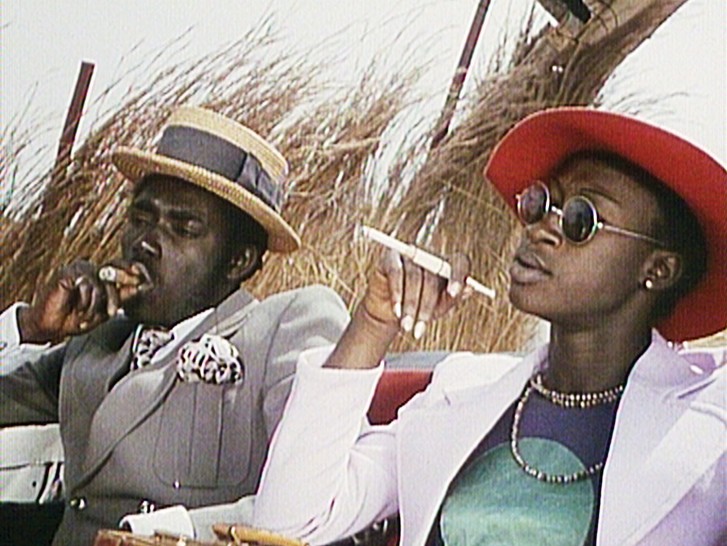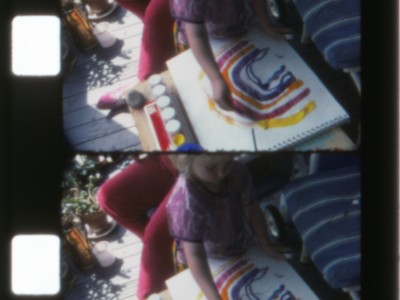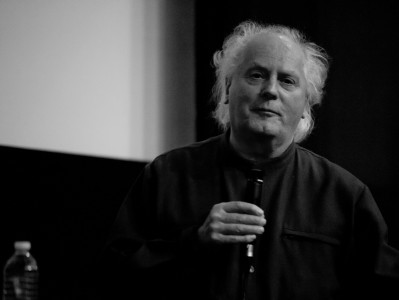
Touki Bouki introduction by David Pendleton and Mati Diop.
Transcript
John Quackenbush 0:00
The first of March, 2015, the Harvard Film Archive screened Touki bouki. This is the recording of the introduction by HFA programmer David Pendleton and filmmaker Mati Diop.
David Pendleton 0:11
In an attempt to make lemonade out of lemons, we're using this, this space to do one of the make-up screenings that we have to do for one of the screenings that was canceled by snow. And that is our screening of the remarkable Touki bouki from Senegal, 1973, directed by Djibril Diop Mambéty, which we're presenting in conjunction with our screening of the films of Mati Diop, the filmmaker who's standing beside me, who is the most recent recipient of the Genevieve McMillan-Reba Stewart Fellowship—in support of Francophone African filmmakers—here at Harvard. And Mati's most recent film is called Mille soleils, A Thousand Suns. And it's a film that has a special relationship to Touki bouki. Touki bouki was the first film by her uncle, Diop Mambéty. First feature film, sorry, by her uncle. And we're doing sort of a joint introduction, which we're still, I'm still sort of working on how these things work. So yeah, you can jump in...
Mati Diop
Oh yeah, yeah.
David Pendleton
...whenever you want. One thing I will say, before we get into talking about the film itself, is that we're watching a digital restoration of the film that was completed by the World Cinema Foundation and the Cineteca di Bologna, which does a great deal of restoration. Funded by the World Cinema Foundation, which is supported, in large part, by the Film Foundation, which is Martin Scorsese's organization restoring cinema. And the World Cinema Foundation is doing the important work of preserving films that were not made in Europe or in North America, but that are important for the history of world cinema. And Touki bouki, as you'll see, is, I think, a brilliant example of the kind of ferment that was going on in world cinema in the late 60s and early 1970s. Formal experimentation, mixed with political excitement and a great deal of creative freedom. And that's one of the things that makes Touki bouki, I think, a remarkable film. It's one that plays a lot with form, and I think was probably paying attention to some of the formal, cutting-edge formal work that was happening in Europe at the time, but that also feels in a way, sort of, not at all European. Or at least, there's a sort of a syncretism, or back-and-forth, I think, between, between the influences. I was just reading a quote from Mambéty where he said it was a film about the power of madness. I don't know if,
Mati Diop
Oh, yeah?
David Pendleton
Yeah. I don't know if, if well, Mati, why don't you say something at this point about what the film has meant to you, or your uncle, or how he came to make the film. I was asking you before if he'd gone to film school.
Mati Diop 3:03
Yeah, you were asking me about that if he [went to] cinema school or not. And actually what I was, what I wanted to share with you about the cinema contexts—the film was shot in ‘73—and it was quite a great age for Senegalese cinema at the time. It's thirteen years after independence of Senegal, after French colony. And a lot of colleagues [of] Djibril, like most of the filmmakers next to him, were—so, thirteen years after independence—were very proud of going to France or Soviet Union to [go to] a cinema school. But it was strange, I think, to Djibril, because it was like they needed to have a French stamp, to be, to feel legit, legitim- ?
David Pendleton 4:03
Legitimate.
Mati Diop 4:04
Legitimate. Like, “I [went to] a French school, so I'm a real filmmaker.” It was really... Even if politically, people would have wanted– pardonne, revendiquer?... revindicating an independence in the act, it was very– Yeah, claiming independence. They would still, most of the filmmakers would still need to go through France or other places to feel legitimate.
And Djibril, with Touki bouki, I think it was really a strong angry [statement] against this position the other filmmakers were taking, and he was really revindicating the fact that he didn't [go to] cinema school, not in France, but not in Senegal, either. And it was a real opposition to this idea of finding your own language outside Senegal. And he really claimed that Touki bouki is a film from the inside, not only because it's a very visceral and intimate film, as you will see, but I think he really needed to [reconcile] with the idea of an intern-, sorry, an intern-, a from-the-inside language. And which is a bit ambiguous, because you will see that– I think the ambiguity is beautiful, because he totally flirts with Western codes and French New Wave codes, but never without denying his own African language. So it's really a beautiful creolity, a mix of influences, but revindicates [its] very singular own form. And, yeah, that's mainly what I wanted to say, because I think it's quite– The context of the film is very important. And also... What [else did I want] to say? Hmmm...
David Pendleton 6:30
It's worth pointing out, too, that Mambéty had sort of a sadly abbreviated filmography, because he died at a fairly young age, and also didn't make any films for a number of years after Touki bouki.
Mati Diop 6:41
Yeah, he made a lot of, I mean, a couple of—in between twenty-one and twenty-seven—he made a couple of shorts. Between, sorry, between the age of twenty-one and twenty-seven. He was twenty-seven when he directed Touki bouki, and then, yeah, for twenty years, he did not, for many reasons... It's also very connected to the history of Senegalese cinema, which kind of like crashed. But… do you have anything?
David Pendleton 7:13
No, I think...
Mati Diop 7:14
I came here because I was sure I was going to learn so much about Touki bouki from you.
David Pendleton 7:19
I'm sorry. No, I think we've said what we need to say.
Mati Diop 7:24
Yeah, yeah, yeah.
David Pendleton 7:25
We'll let the film speak for itself. And also, those of you who've seen A Thousand Suns can remember back to that, too, which is in some ways, a very eloquent look back at the hopes expressed by Touki bouki, the hopes represented by Touki bouki, and what's become those hopes afterwards. In any case, thank you all for coming. Thank you, Mati.
Mati Diop 7:44
Thank you.
David Pendleton 7:45
Enjoy the film.
[APPLAUSE]
©Harvard Film Archive
Related film series
Explore more conversations
Liz Coffey & Saul Levine

Paolo Gioli

Grzegorz Skorupski

Margaret Honda

